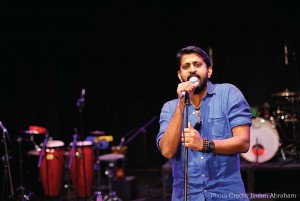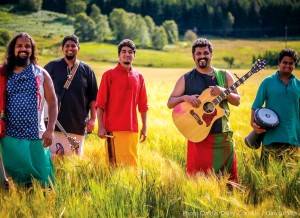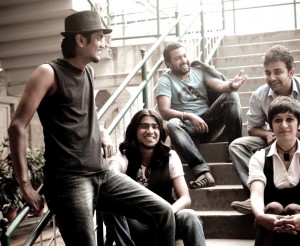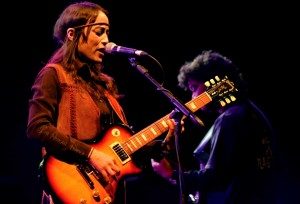The post Homeward bound : Five Indigenous Bands from India appeared first on FWD Life | The Premium Lifestyle Magazine |.
]]>Kerala
Job Kurian talks to us about his music, his life and his journey from being a reality show winner to a seasoned musician.
How easy was it to switch over from engineering to music?
The decision was made very early. Even while I was doing my Engineering in Instrumentation Technology from a  college in Hassan, Karnataka, I knew very well that I would have nothing to do with the field once the degree was done. For me, it was music all the way. Looking back, I think I was very fortunate to have very supportive people around me- my parents, my professors at college and so many more. These were the people who shared my dreams.
college in Hassan, Karnataka, I knew very well that I would have nothing to do with the field once the degree was done. For me, it was music all the way. Looking back, I think I was very fortunate to have very supportive people around me- my parents, my professors at college and so many more. These were the people who shared my dreams.
What do you have to say about Music Mojo?
The best thing about Mojo is the creative freedom that it allows the artists. And the result is there to be seen- the viral youtube videos, the Facebook shares and the cult status many of us who performed there have achieved. As a matter of fact, I was one of the very first artists who performed at Mojo when it started off and for me too, it has worked wonders. For instance, my first original album, Thaalam, released five years before Mojo, had gone largely unnoticed. But after Mojo, the sales suddenly picked up and today, I get requests for songs from thaalam on my live shows. It’s always heartwarming to have your originals appreciated.
Originals and covers, the approach and response, how has it been?
Oh, for the covers, the response has been in the extremes- absolute adoration to brickbats. When I do a cover, these are songs are close to my heart and also to every Malayali’s. So I can understand when a few listeners take offense. On the contrary, originals are solely about the artists. They have the soul of the artists in them, an innocent purity about them because they are made without a purpose, without any biases. Given a choice, originals are all that an artist would want to do. However, commercial viability is a problem. But now there seems to be more acceptance- our Kerala audience is warming up to originals, new genres, experiments and new artists.
You don the composer’s hat and working in movies both as a singer and composer, how has it been?
Composing is something that I enjoy doing. I have composed music for a few movies, the last one being Rasam. Making music for a movie is a different challenge altogether as you are trying to visualize the director’s dream, and I must say that I enjoy the challenge.
The Raghu Dixit Project
Mysore
When they say that music transcends boundaries, this band is a great example. Raghu Dixit is popularly known as the man in a lungi with a guitar. His strong voice has filled auditoriums around the world.
How would you define the music of the Raghu Dixit Project?
We believe our music truly represents the India of today. We are very proud of our tradition and culture. Kind of very passionately holding on to it but at the same time we are also exploring and feeling cultures from all around the world. Our music is a result of that. We collaborate with styles and sounds from all around the world to make our  own.
own.
What was the spark that kick started Raghu Dixit?
I quit my job as a scientist and decided to follow my heart. I was passionate about music. Playing small gigs and scraping through life, it took seven years for my first break. I was spotted in Mumbai by Vishal Dadlani and Shekhar Ravjiani, the day I had decided to go back home and end this ‘stupidity.’ They came up to me and asked if the songs I performed were all mine. I gave them my sob story with a little drama and exaggeration. I landed in their studio the next day. In the middle of a song, they told me that they were starting a new record label and asked if I would be interested. The rest is history.
You have even played for Later…with Jools Holland on BBC. How do you keep up?
We play around 17 gigs a month. This includes a lot of travelling, hotel rooms, making friends and unpredictable food. Yoga keeps me sane at the moment. I had a beautiful childhood and the images of the sunset on the Godavari (which have been captured in the song Yaadon Ki Kyari) always brings me up when I’m feeling down. It is a fun but intense life, and I have not found anyone hotter than music…(smiles).
Every song of yours has a story. What is your message to the world?
Sometimes you want to give up and show your hands and say it’s not going to happen ever. You might be thinking you are the most miserable person in the world. Then God works his magic. He doesn’t come with lightning and a background score. He does it through people. It is very important to believe, more than ever before, that all people are good. We have to feel that positivity from others, and we can make this world a happy place. A lot of people have walked into my life and changed my life forever.
Bangalore
Lagori has been brewing some amount craziness among the youngsters for quite some time. The Mental-ness doesn’t die off stage and they were spry during the interview.
Can you introduce yourself as a band?
Tejas: We are called Lagori. We have Vinyl Kumar on the drums. Edward aka Eddie on the acoustic, Shalini on the base, Geet Vaz on the electric guitar who also manages the band, and last but not the least, myself Tejas on the vocals.
How did Lagori take its birth?
Tejas: It was Geet’s birthday around four years. Geet, Edward, and Vinyl used to play for a Western heavy rock band called Fandom. It covered metal and all kinds of progressive rock. They decided to play some Hindi music.
Edward: We wrote a song in English, got it google translated song turned out to be good. We fixed on Lagori because it was different and nice.
Tell us something about Boom Shankar.
Edward: We wanted to write a song for the crowd. A fun song that the crowd will come and sing.
Tejas: At six o’clock in the morning in one of the markets, there was an old man who was drunk. He was flipping, if you watch the video, with some Kung Fu and martial arts movements. (laughs) He was having fun. There was a lovely eunuch who started dancing amazingly. In fact, she kissed me because I loved her so much!
Edward: People felt that Shalini was an actress, and we had come for touch-ups. They bought us some bananas and fruits.
How has the audience taken the genre Indie Rock?
Tejas: I think Indie rock was always there for a while now. Like what Vinyl said, the band called Moksha, their original compositions also had them writing songs about their experiences in India. They have got a very local feel to it.
Geet: Indie rock can be Hindi, English or Tamil – Indie is independent. Youngsters want something new. It is not that they do not like Bollywood or classical music, but when they have something fused together like western influence with Indian vocal, it is more catchy.
Is there anything else that you people do, other than music?
Tejas: Geet, who manages the band is also a CA. Eddie works as an HR manager for Samsung. Vinyl has started his school, Artista Academy of Music. Eddie and Vinyl teach in that school. Shalini is a full-time musician. She works for Vasundhara Das and other bands.
Shalini: I was working as a techie in SAT. When I met these guys, I decided to become a full-time musician a year ago
Agnee
Pune
Named their band after a burning desire for music, and they’re still on fire.
How did you tie up so close with MTV’s creative team?
Raghu Ram is a very close friend and has been since before Agnee was even formed. He’s seen us compose in his living room and ours. In 2006, he asked if we would like to do the Roadies Theme song for him. What started with the Roadies Theme song in season 5 went ahead with our association with Splitsvilla Season 2. Then we went to meet Ashish Patil, the then creative head of MTV.
Your Deewarist experience?
It was fantastic. The visual team and the directors, Vishwesh and Fred, were just fabulous. We were with a bunch of friends who are all as mad as us, the Parikrama guys, Shiilpa and Monica. It was also the only way we would have released our first ever English composition (Koco and I had worked on this song in 2005). We didn’t think, we’d ever release this one until the Dewarists happened.
Working with movie soundtracks?
2 States’ music was composed by Shankar Ehsaan Loy and Queen and Lootera by Amit Trivedi. I was called to sing for these projects.I learn a lot from SEL every time I record with them. With Amit, I wonder how one can think so differently?
How would you describe the evolution of the band’s sound?
We started our career with lyrics affecting our music, composing to Kabir Vani. Along the way, we’ve composed tunes first and then asked lyricists to write to the melody and in some cases I’ve written the song myself. Overall, the evolution of our music has got more to do with sound than lyrical content though. On the sound front, we’ve become more cohesive, we’ve also been happy to work on heavily produced and sparsely produced tracks equally.
The concert bizarre tales of yours are?
I jumped off a 10-foot high stage at the Youth Commonwealth Games show in Pune over a drum roll. The first time I landed perfectly and so like a maniac decided to do it again. Only this time, someone from the audience decided to try to help and in avoiding him I fell over and tore my ACL beyond. I performed the rest of the show in serious pain, sitting on a chair centre stage while the dancers were doing serious lifts and moves all around me. It was hilarious. I remember my Mom was so angry after the show when I told her that she asked me “Are you an acrobat or a singer?”
Shillong
Rudy Wallang and Tipriti Kharbangar decided to form a band to take us out of our blues. While interviewing Rudy, she said that her guitar and Tip’s ( Tiprita) soulful vocals is what brought life to their genre of music, blues rock.
When did you start playing the Blues? Reason for the name ‘Soulmate?’
I discovered the Blues when I was around 18 years of age. But I started playing the Blues after I left The Great Society, a band I was a part of for 12 years here in Shillong. Soulmate’s Blues is inspired by life as we live by it. Tips had inspired me to write songs and that too from a female’s perspective. Soulmate got the name from a song I had written called ‘The Blues Is My Soulmate’. It’s in our first album, ‘Shillong.’
North-East has always been a place that gave many of the best musicians in the country. What inspired you to take up Blues?
I just felt so good when I listened to Freddie King and BB King and all the other Blues musicians and singers. I felt deeply touched by the music. It was simple but again not so simple to play! One had to be totally immersed in it to be able to play it. With the Great Society, we did play some blues and Blues-rock songs but it was only later that I decided that this was the music I wanted to play.
Do you feel that Blues and Jazz critics in India are fairly less? If so, why?
Yes and that’s because 99% of them don’t understand the music. It’s fairly new to them. I don’t think there is a ‘Blues scene’ in India. There are other bands besides us that play blues but gigs are few and far between. There are no dedicated Blues venues in India. There are two Blues festivals : Mahindra Blues Fest in Mumbai and Ode To The Blues in Bangalore, but that’s about it. We play wherever and whenever we get a chance. This is our life, and we live to play our music, be it at a club or a festival.
Your biggest musical influences?
I grew up listening to my father, Late Toto Wallang. He was a musician in his time, and he would practice at home with his band. Then of course there were the Beatles, Elvis Presley, Tom Jones, The Platters, etc. This was music that my mum and dad would listen to! Later on when I took up music as a profession, I listened to Roy Buchanan, Albert Collins, Lightnin’ Hopkins, BB, Albert and Freddie King , Carlos Santana, Van Morrison, George Harrison to name a few.
What’s your favorite composition and your memorable gig so far?
My fave composition? The songs I’ve written are babies, but I like ‘The Price’, a song I wrote on our first album. That’s close to my heart! My favorite gig would be the one in Noida in October 2012. We opened for Carlos Santana, and he came onstage and joined us on for one of our songs. Nothing can ever beat that!
The post Homeward bound : Five Indigenous Bands from India appeared first on FWD Life | The Premium Lifestyle Magazine |.
]]>
